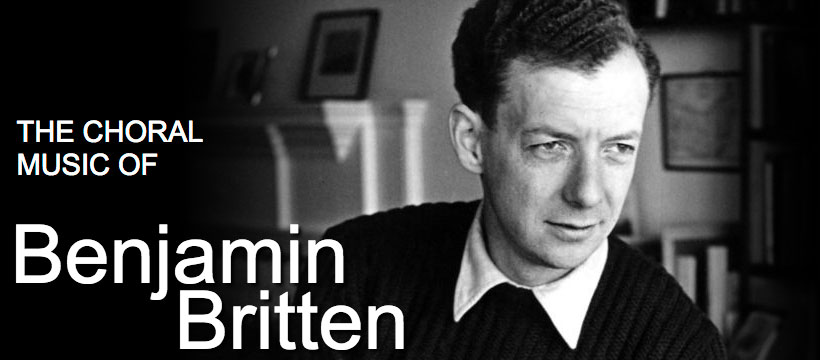


Article: Explore the Choral Music of Benjamin Britten
by Paul Spicer
Benjamin Britten (1913-1976) was a unique force in British music. Of the fine composers among his contemporaries, none wrote such a wide variety of music across such a broad spectrum of genres and for such a range of ages and abilities. In many ways, though he might have been surprised by the comparison, he was the natural successor to Vaughan Williams, whose instincts for community and the nurture of amateur musicians brought him an almost cult-like status in Britain. Britten did not devote himself so wholeheartedly to these things, but a sizeable proportion of his choral music is easily within the reach of a good ordinary choir, another part is well within the grasp of a reasonable church choir, and there is, of course, all the music he wrote specifically for children. Among the 60 or so non-operatic choral works there are also works which are exceptionally demanding and perhaps best left to professionals and outstanding amateurs. The range of this output and the frequency of performance of the better-known works underline Britten's ubiquity in the world of choral singing, not just in the English-speaking community but far beyond.
As with many composers who have devoted themselves to writing a large corpus of music for one particular genre, Britten has suffered from being too well-known for a few familiar pieces. Rejoice in the Lamb, A Ceremony of Carols, Hymn to the Virgin, Hymn to St Cecilia, Jubilate Deo in C and others have tended to obscure the fuller picture of Britten's choral output and, if nothing else, I hope that choral directors will look beyond their favourites and explore the rich variety of music which is still almost undiscovered. Schools, or choirs of upper or lower voices, will find music here of wonderful quality which rarely sees the light of day. Similarly, there is a genuine mix of sacred and secular and some useful blurring of the edges where words can be equally appropriate in either context. I hope that the corresponding online guide will also be of real practical help to those who aim to build programmes which may be structured in specific ways - thematically, by voice type, by religious or non-religious setting, or by the balancing of a well-known piece by a less-familiar or almost unknown work. It is a spirit of discovery and adventure which should fire the imagination, and it is a love of all this music which has inspired the commentary writing.
Britten was a practical composer. He knew that the music he wrote was performable because he himself was an accomplished professional musician. This is, again, where the Vaughan Williams analogy holds true. To be there, in among those doing the singing, directing the performance, advising other conductors and acquiring great expertise and experience over a creative lifetime, gave him an unusual insight into what choirs enjoy singing. He discovered what levels were attainable by different types of group, and did much to encourage that sense of ambition which has led to a genuine rise in the quality of amateur choral music-making.
Britten was also a practical composer because he gave his performers all the information they need to deliver a convincing and 'authentic' performance - his scores have clear and unambiguous performance directions throughout. He is known to have remarked that, if musicians follow his instructions to the letter (and can play or sing the notes in an accurate and musical fashion), they will give a performance of which the composer would approve. So the principal instruction to choral directors is to prepare the score thoroughly prior to embarking on rehearsals. Read the words in order to understand Britten's setting of them, and mark, learn and inwardly digest Britten's clear instructions about speed, dynamics, phrasing, and, often most importantly, articulation. The mood of a piece so often comes from the composer's approach to the text. Britten tended to choose texts which were not widely set by other composers. But to compare, for instance, his two connected settings of Gerard Manley Hopkins' "God's Grandeur" in A.M.D.G. and "The World of the Spirit" with Kenneth Leighton's version is to clearly demonstrate the point. No two responses could be more different and yet each excitingly shows the composer's individual reaction to the poem. To examine Britten's popular Jubilate Deo in C alongside Howells' Collegium Regale setting of the same words written some fifteen years earlier is, again, to emphasize how their idiomatic interpretations of the text helped shape each piece.
Britten's style grew out of the English choral tradition he knew so well. He had not been a cathedral chorister but had boarded at Gresham's School from the age of 14. There he was exposed to the standard repertoire of the Anglican Church and his earliest well-known piece, "A Hymn to the Virgin," was written when he was only 16 and still a schoolboy. It unequivocally shows his feeling for the beauty and potential of choral sound, so it is no wonder that such precocious talent should develop to the extent it did. While there are pieces from his output which are more stylistically searching, this early gem sets the scene for a choral output that is essentially approachable, tonal, lyrical, and pleasing to both performer and listener. It is a remarkable legacy.
